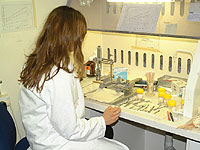| Biotechnology - 3052 |
|
|||||||||||||||||||||||||||||||||||||||||||

Program Summary
Biotechnology can be defined as the use of various biological processes to make products and perform services. In biotechnology, living cells and biochemical macromolecules such as proteins, DNA and RNA are applied in a rapidly expanding range of activities of direct benefit to society. Biotechnology is used for the production of pharmaceuticals, food and industrial chemicals, in the development of improved crops and livestock for farming, for environmental clean-up, and in forensics. Modern biotechnology makes practical use of the most recent scientific advances in areas such as molecular genetics and molecular cell biology.
The development of recombinant DNA technology has resulted in the ability to create, modify and improve industrial organisms and to produce large quantities of any useful protein. Based on this technology, biopharmaceuticals including hormones, vaccines, anti-hypertensive agents, anti-inflammatory agents and new therapies for the treatment of cancer are being developed with the potential to revolutionise medicine. The sequencing of the human genome and the rapid emergence of high-throughput genomic and proteomic techniques is resulting in a surge of new drug targets. Translation of this advanced knowledge into useful therapies and improved medical practices requires the application of biotechnology. Microorganisms and viruses are being modified for use in controlling plant and animal diseases and pests. Diagnostic kits are being developed for use in forensic science and in product identification and quality control. Genetic improvements in agriculture, plants and animals are becoming a reality, as is the control of inborn genetic disorders in humans. The ability to treat diseased and injured organs with replacement cells and tissues generated outside of the body is advancing rapidly. Bioprocesses are also used for environmental remediation, for the extraction of minerals from low-grade ores, and for the development of novel processes to treat waste and degrade recalcitrant molecules. Environmental biotechnology is an area of vital importance for our increasingly polluted planet. The future for expansion in all the above areas is immense. Our ability to cope with many medical, environmental, agricultural and manufacturing problems in th 21st century will depend heavily on advances in biotechnology. This program leads to the award of a Bachelor of Science Degree over four years full-time study, with Honours for students who perform with merit. Program Objectives and Learning Outcomes The Biotechnology program aims to provide a comprehensive education in all aspects of modern biotechnology.
Stage 1
Note: One of the following courses/combinations may be substituted for MATH1031
OR
Stage 2
PLUS 12 UOC from:
Stage 3
PLUS one course from:
PLUS an additional 12 UOC from:
Note: MICR3621 Microbial Genetics (Advanced) may be substituted for MICR3021.
Stage 4
Note: Enrol in BIOT4053 (total 36 UOC) for both sessions through the School Office.
General Education Requirements The University requires all students to complete a coherent sequence of General Education courses. The General Education Program is an integral part of the BSc Biotechnology course and gives students the opportunity to address some of the key questions they will face as individuals, citizens and professionals. A total of 12 UOC in General Education course(s) is required.
For further information, please refer to General Education in the Table of Contents (see the left-hand side of this page). Progression and Exclusion
Students whose performance is unsatisfactory will be notified in writing and asked to show at the end of the academic year why they should remain in their course of study. Any student who is deemed to be making unsatisfactory progress, will be considered as having poor academic progression. Unsatisfactory progress or academic standing may include:
Students not on good academic standing will be notified by the University or Faculty in writing. Notified students will be assessed in accordance with the University's procedures. Failure to respond accordingly can result in exclusion from the program, or transfer to the Science and Mathematics program (3970), provided that the progression requirements in that course have been met. Also see the section on progression and exclusion ('Restrictions on Students Re-enrolling') in the Student Guide.
Progression to Stage 4 Honours Progression to Stage 4 is subject to academic performance. Students seeking to enrol in a Stage 4 Honours program are required to have the approval of the Head of School and normally will be required:
Students who do not attain an average or 65 or higher in Stage 3 of the program are normally required to transfer to the Bachelor of Science program (3970) and take out the BSc award at Pass level.
Note: Please refer to Program Structure above for rules relating to program requirements For information regarding fees for UNSW programs, please refer to the following website: https://my.unsw.edu.au/student/fees/FeesMainPage.html
Graduates in Biotechnology will be able to find employment in industries and other organisations involved with drug development, biopharmaceutical production, food processing as well as agricultural and environmental biotechnology.
Area(s) of Specialisation |
||||||||||||||||||||||||||||||||||||||||||||

| Contacts | Library | myUNSW | WebCT |